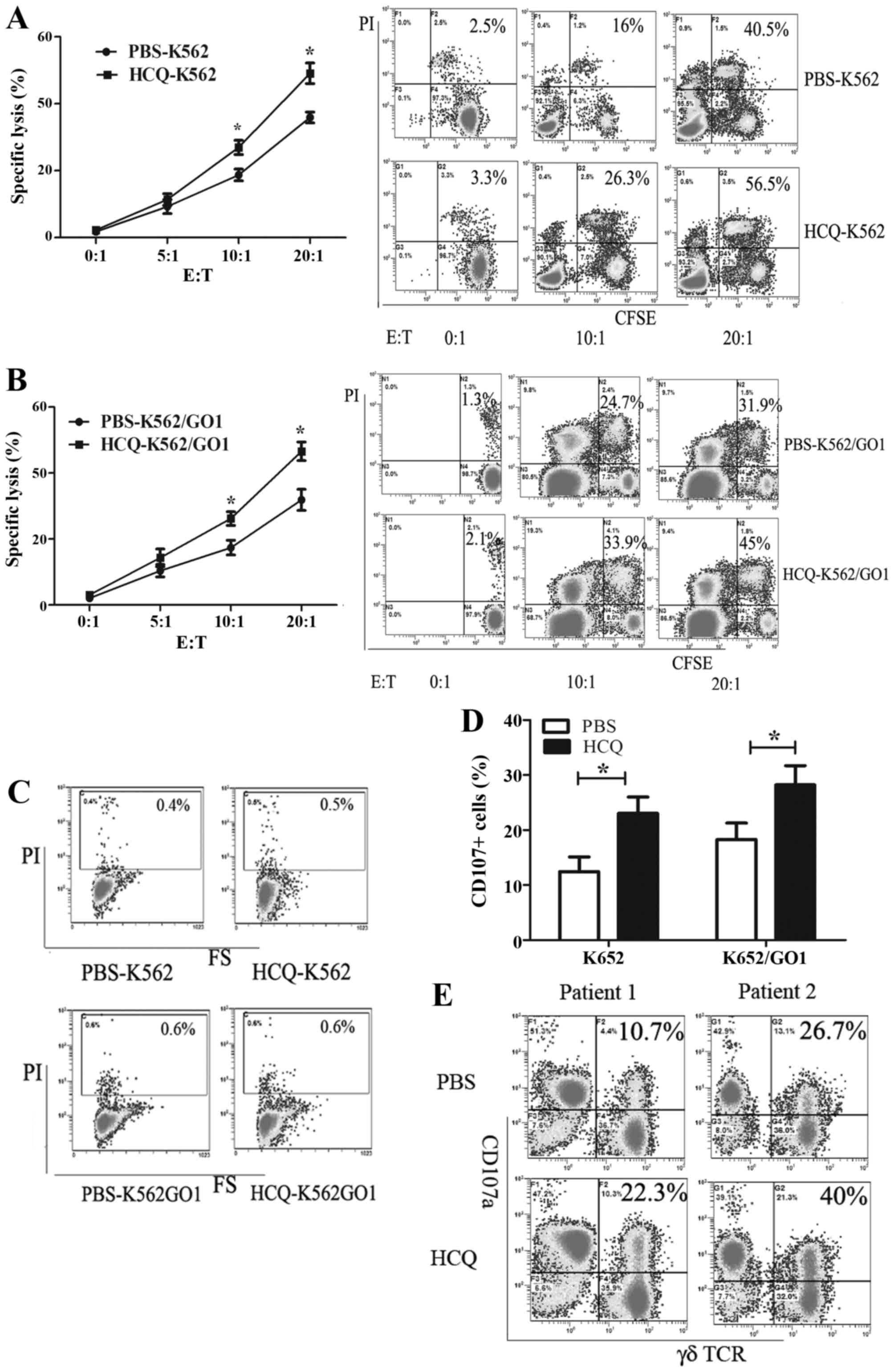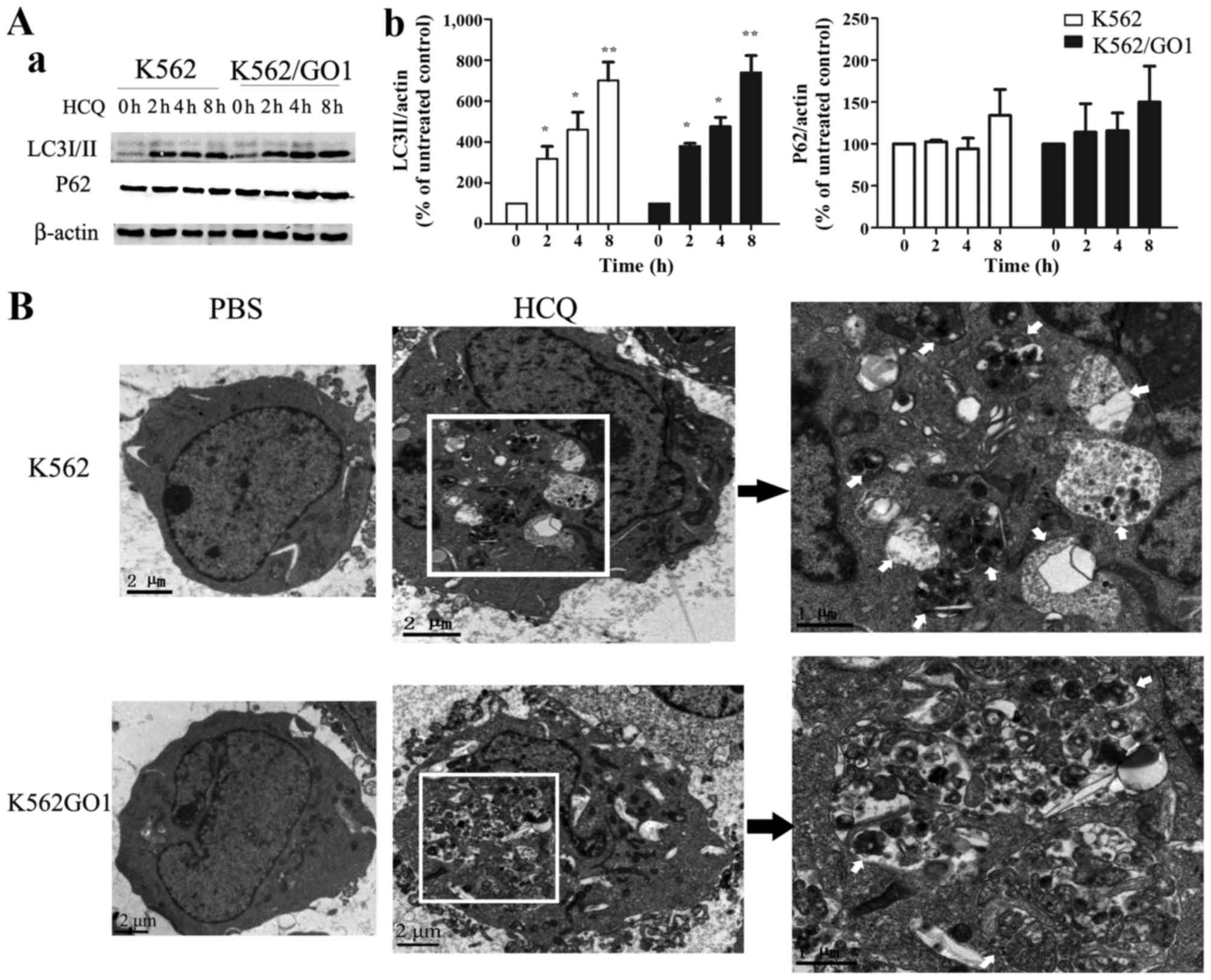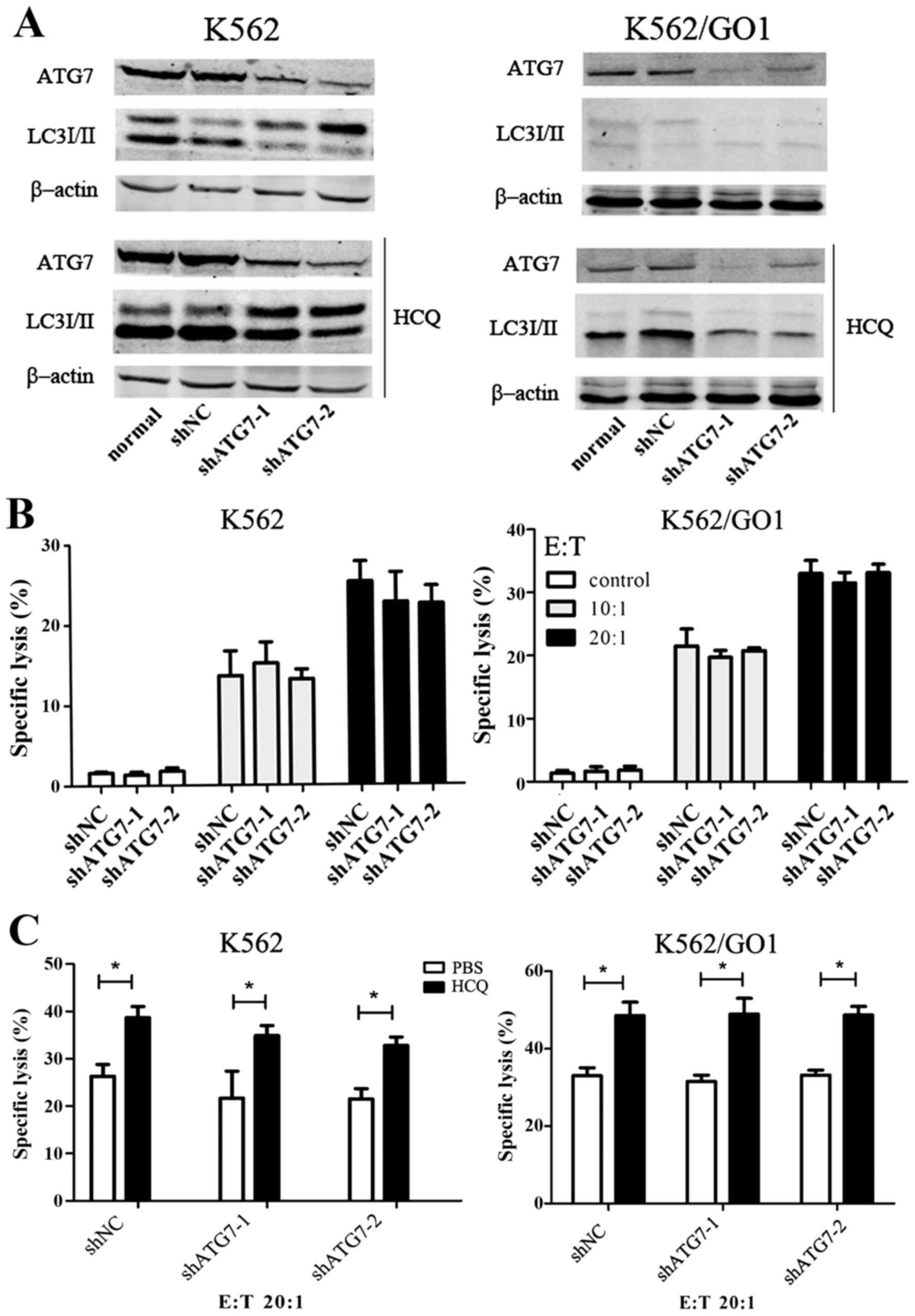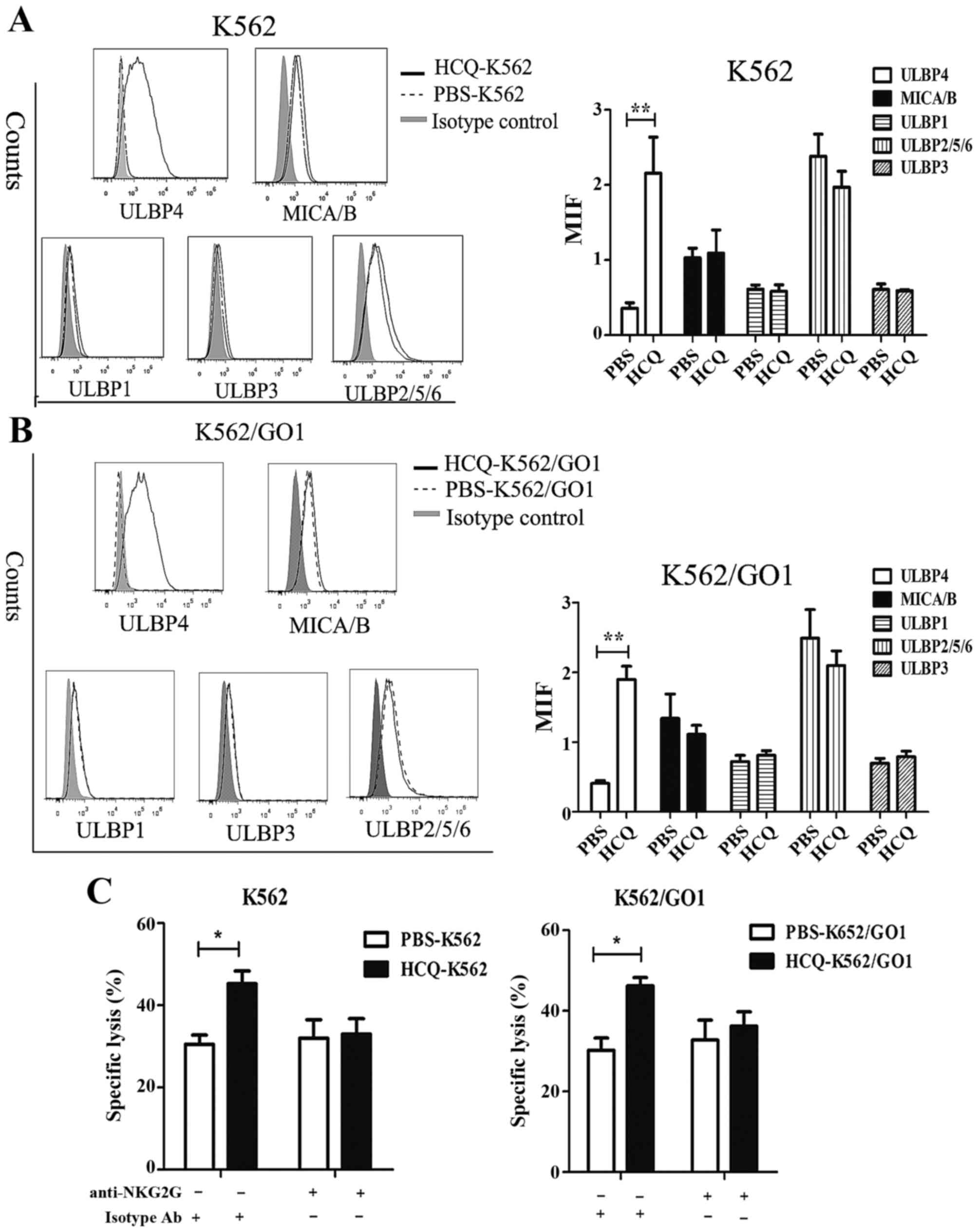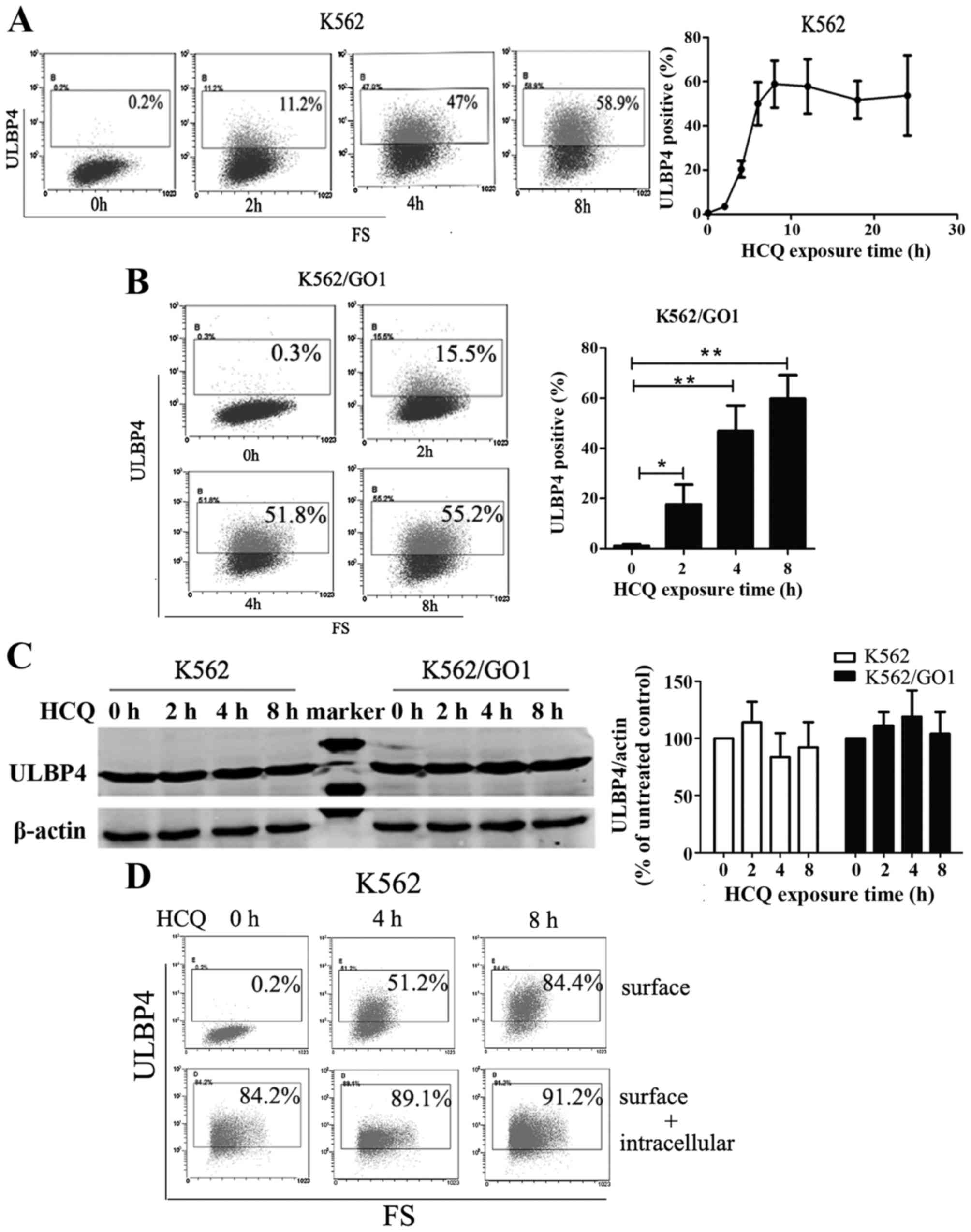|
1
|
Daley GQ, Van Etten RA and Baltimore D:
Induction of chronic myelogenous leukemia in mice by the
P210bcr/abl gene of the Philadelphia chromosome. Science.
247:824–830. 1990. View Article : Google Scholar : PubMed/NCBI
|
|
2
|
Helgason GV, Karvela M and Holyoake TL:
Kill one bird with two stones: Potential efficacy of BCR-ABL and
autophagy inhibition in CML. Blood. 118:2035–2043. 2011. View Article : Google Scholar : PubMed/NCBI
|
|
3
|
Branford S, Rudzki Z, Walsh S, Parkinson
I, Grigg A, Szer J, Taylor K, Herrmann R, Seymour JF, Arthur C, et
al: Detection of BCR-ABL mutations in patients with CML treated
with imatinib is virtually always accompanied by clinical
resistance, and mutations in the ATP phosphate-binding loop
(P-loop) are associated with a poor prognosis. Blood. 102:276–283.
2003. View Article : Google Scholar : PubMed/NCBI
|
|
4
|
Sawyers CL, Hochhaus A, Feldman E, Goldman
JM, Miller CB, Ottmann OG, Schiffer CA, Talpaz M, Guilhot F,
Deininger MW, et al: Imatinib induces hematologic and cytogenetic
responses in patients with chronic myelogenous leukemia in myeloid
blast crisis: Results of a phase II study. Blood. 99:3530–3539.
2002. View Article : Google Scholar : PubMed/NCBI
|
|
5
|
Zeng X, Zhao H, Li Y, Fan J, Sun Y, Wang
S, Wang Z, Song P and Ju D: Targeting Hedgehog signaling pathway
and autophagy overcomes drug resistance of BCR-ABL-positive chronic
myeloid leukemia. Autophagy. 11:355–372. 2015. View Article : Google Scholar : PubMed/NCBI
|
|
6
|
Carew JS, Nawrocki ST, Kahue CN, Zhang H,
Yang C, Chung L, Houghton JA, Huang P, Giles FJ and Cleveland JL:
Targeting autophagy augments the anticancer activity of the histone
deacetylase inhibitor SAHA to overcome Bcr-Abl-mediated drug
resistance. Blood. 110:313–322. 2007. View Article : Google Scholar : PubMed/NCBI
|
|
7
|
Tong Y, Liu YY, You LS and Qian WB:
Perifosine induces protective autophagy and upregulation of ATG5 in
human chronic myelogenous leukemia cells in vitro. Acta Pharmacol
Sin. 33:542–550. 2012. View Article : Google Scholar : PubMed/NCBI
|
|
8
|
Song P, Ye L, Fan J, Li Y, Zeng X, Wang Z,
Wang S, Zhang G, Yang P, Cao Z, et al: Asparaginase induces
apoptosis and cytoprotective autophagy in chronic myeloid leukemia
cells. Oncotarget. 6:3861–3873. 2015. View Article : Google Scholar : PubMed/NCBI
|
|
9
|
Jiang S, Fan J, Wang Q, Ju D, Feng M, Li
J, Guan ZB, An D, Wang X and Ye L: Diosgenin induces ROS-dependent
autophagy and cytotoxicity via mTOR signaling pathway in chronic
myeloid leukemia cells. Phytomedicine. 23:243–252. 2016. View Article : Google Scholar : PubMed/NCBI
|
|
10
|
Chen JJ, Long ZJ, Xu DF, Xiao RZ, Liu LL,
Xu ZF, Qiu SX, Lin DJ and Liu Q: Inhibition of autophagy augments
the anticancer activity of α-mangostin in chronic myeloid leukemia
cells. Leuk Lymphoma. 55:628–638. 2014. View Article : Google Scholar
|
|
11
|
Kamitsuji Y, Kuroda J, Kimura S, Toyokuni
S, Watanabe K, Ashihara E, Tanaka H, Yui Y, Watanabe M, Matsubara
H, et al: The Bcr-Abl kinase inhibitor INNO-406 induces autophagy
and different modes of cell death execution in Bcr-Abl-positive
leukemias. Cell Death Differ. 15:1712–1722. 2008. View Article : Google Scholar : PubMed/NCBI
|
|
12
|
Yogalingam G and Pendergast AM: Abl
kinases regulate autophagy by promoting the trafficking and
function of lysosomal components. J Biol Chem. 283:35941–35953.
2008. View Article : Google Scholar : PubMed/NCBI
|
|
13
|
Calabretta B and Salomoni P: Inhibition of
autophagy: A new strategy to enhance sensitivity of chronic myeloid
leukemia stem cells to tyrosine kinase inhibitors. Leuk Lymphoma.
52(Suppl 1): 54–59. 2011. View Article : Google Scholar : PubMed/NCBI
|
|
14
|
Bellodi C, Lidonnici MR, Hamilton A,
Helgason GV, Soliera AR, Ronchetti M, Galavotti S, Young KW, Selmi
T, Yacobi R, et al: Targeting autophagy potentiates tyrosine kinase
inhibitor-induced cell death in Philadelphia chromosome-positive
cells, including primary CML stem cells. J Clin Invest.
119:1109–1123. 2009. View
Article : Google Scholar : PubMed/NCBI
|
|
15
|
Townsend KN, Hughson LR, Schlie K, Poon
VI, Westerback A and Lum JJ: Autophagy inhibition in cancer
therapy: Metabolic considerations for antitumor immunity. Immunol
Rev. 249:176–194. 2012. View Article : Google Scholar : PubMed/NCBI
|
|
16
|
Liang X, De Vera ME, Buchser WJ, Romo de
Vivar Chavez A, Loughran P, Beer Stolz D, Basse P, Wang T, Van
Houten B, Zeh HJ III, et al: Inhibiting systemic autophagy during
interleukin 2 immunotherapy promotes long-term tumor regression.
Cancer Res. 72:2791–2801. 2012. View Article : Google Scholar : PubMed/NCBI
|
|
17
|
Zhu S, Cao L, Yu Y, Yang L, Yang M, Liu K,
Huang J, Kang R, Livesey KM and Tang D: Inhibiting autophagy
potentiates the anticancer activity of IFN1α/IFNα in chronic
myeloid leukemia cells. Autophagy. 9:317–327. 2013. View Article : Google Scholar :
|
|
18
|
Baginska J, Viry E, Berchem G, Poli A,
Noman MZ, van Moer K, Medves S, Zimmer J, Oudin A, Niclou SP, et
al: Granzyme B degradation by autophagy decreases tumor cell
susceptibility to natural killer-mediated lysis under hypoxia. Proc
Natl Acad Sci USA. 110:17450–17455. 2013. View Article : Google Scholar : PubMed/NCBI
|
|
19
|
Noman MZ, Janji B, Kaminska B, Van Moer K,
Pierson S, Przanowski P, Buart S, Berchem G, Romero P, Mami-Chouaib
F, et al: Blocking hypoxia-induced autophagy in tumors restores
cytotoxic T-cell activity and promotes regression. Cancer Res.
71:5976–5986. 2011. View Article : Google Scholar : PubMed/NCBI
|
|
20
|
Bonneville M, O'Brien RL and Born WK:
Gammadelta T cell effector functions: A blend of innate programming
and acquired plasticity. Nat Rev Immunol. 10:467–478. 2010.
View Article : Google Scholar : PubMed/NCBI
|
|
21
|
Gertner-Dardenne J, Castellano R,
Mamessier E, Garbit S, Kochbati E, Etienne A, Charbonnier A,
Collette Y, Vey N and Olive D: Human Vγ9Vδ2 T cells specifically
recognize and kill acute myeloid leukemic blasts. J Immunol.
188:4701–4708. 2012. View Article : Google Scholar : PubMed/NCBI
|
|
22
|
Meeh PF, King M, O'Brien RL, Muga S,
Buckhalts P, Neuberg R and Lamb LS Jr: Characterization of the
gammadelta T cell response to acute leukemia. Cancer Immunol
Immunother. 55:1072–1080. 2006. View Article : Google Scholar
|
|
23
|
Siegers GM, Felizardo TC, Mathieson AM,
Kosaka Y, Wang XH, Medin JA and Keating A: Anti-leukemia activity
of in vitro-expanded human gamma delta T cells in a xenogeneic Ph
leukemia model. PLoS One. 6:e167002011. View Article : Google Scholar
|
|
24
|
D'Asaro M, La Mendola C, Di Liberto D,
Orlando V, Todaro M, Spina M, Guggino G, Meraviglia S, Caccamo N,
Messina A, et al: Vγ9Vδ2 T lymphocytes efficiently recognize and
kill zoledronate-sensitized, imatinib-sensitive, and
imatinib-resistant chronic myelogenous leukemia cells. J Immunol.
184:3260–3268. 2010. View Article : Google Scholar : PubMed/NCBI
|
|
25
|
Wu KN, Wang YJ, He Y, Hu YX, Fu HR, Sheng
LX, Wang BS, Fu S and Huang H: Dasatinib promotes the potential of
proliferation and antitumor responses of human γδT cells in a
long-term induction ex vivo environment. Leukemia. 28:206–210.
2014. View Article : Google Scholar
|
|
26
|
Mishima Y, Terui Y, Mishima Y, Taniyama A,
Kuniyoshi R, Takizawa T, Kimura S, Ozawa K and Hatake K: Autophagy
and autophagic cell death are next targets for elimination of the
resistance to tyrosine kinase inhibitors. Cancer Sci. 99:2200–2208.
2008. View Article : Google Scholar : PubMed/NCBI
|
|
27
|
Maes H, Kuchnio A, Peric A, Moens S, Nys
K, De Bock K, Quaegebeur A, Schoors S, Georgiadou M, Wouters J, et
al: Tumor vessel normalization by chloroquine independent of
autophagy. Cancer Cell. 26:190–206. 2014. View Article : Google Scholar : PubMed/NCBI
|
|
28
|
Maycotte P, Aryal S, Cummings CT, Thorburn
J, Morgan MJ and Thorburn A: Chloroquine sensitizes breast cancer
cells to chemotherapy independent of autophagy. Autophagy.
8:200–212. 2012. View Article : Google Scholar : PubMed/NCBI
|
|
29
|
Chalupny NJ, Sutherland CL, Lawrence WA,
Rein-Weston A and Cosman D: ULBP4 is a novel ligand for human
NKG2D. Biochem Biophys Res Commun. 305:129–135. 2003. View Article : Google Scholar : PubMed/NCBI
|
|
30
|
Bacon L, Eagle RA, Meyer M, Easom N, Young
NT and Trowsdale J: Two human ULBP/RAET1 molecules with
transmembrane regions are ligands for NKG2D. J Immunol.
173:1078–1084. 2004. View Article : Google Scholar : PubMed/NCBI
|
|
31
|
Qi J, Peng H, Gu ZL, Liang ZQ and Yang CZ:
Establishment of an imatinib resistant cell line K562/G01 and its
characterization. Zhonghua Xue Ye Xue Za Zhi. 25:337–341. 2004.In
Chinese. PubMed/NCBI
|
|
32
|
Godoy-Ramirez K, Mäkitalo B, Thorstensson
R, Sandström E, Biberfeld G and Gaines H: A novel assay for
assessment of HIV-specific cytotoxicity by multiparameter flow
cytometry. Cytometry A. 68:71–80. 2005. View Article : Google Scholar : PubMed/NCBI
|
|
33
|
Gertner J, Wiedemann A, Poupot M and
Fournié JJ: Human gammadelta T lymphocytes strip and kill tumor
cells simultaneously. Immunol Lett. 110:42–53. 2007. View Article : Google Scholar : PubMed/NCBI
|
|
34
|
Klionsky DJ, Abdalla FC, Abeliovich H,
Abraham RT, Acevedo-Arozena A, Adeli K, Agholme L, Agnello M,
Agostinis P, Aguirre-Ghiso JA, et al: Guidelines for the use and
interpretation of assays for monitoring autophagy. Autophagy.
8:445–544. 2012. View Article : Google Scholar : PubMed/NCBI
|
|
35
|
Mizushima N, Yoshimori T and Levine B:
Methods in mammalian autophagy research. Cell. 140:313–326. 2010.
View Article : Google Scholar : PubMed/NCBI
|
|
36
|
Klionsky DJ1, Baehrecke EH, Brumell JH,
Chu CT, Codogno P, Cuervo AM, Debnath J, Deretic V, Elazar Z,
Eskelinen EL, et al: Comprehensive glossary of autophagy-related
molecules and processes (2nd edition). Autophagy. 7:1273–1294.
2011. View Article : Google Scholar : PubMed/NCBI
|
|
37
|
Rincon-Orozco B, Kunzmann V, Wrobel P,
Kabelitz D, Steinle A and Herrmann T: Activation of Vγ9Vδ2T cells
by NKG2D. J Immunol. 175:2144–2151. 2005. View Article : Google Scholar : PubMed/NCBI
|
|
38
|
Vantourout P and Hayday A:
Six-of-the-best: Unique contributions of γδT cells to immunology.
Nat Rev Immunol. 13:88–100. 2013. View Article : Google Scholar : PubMed/NCBI
|
|
39
|
Kong Y, Cao W, Xi X, Ma C, Cui L and He W:
The NKG2D ligand ULBP4 binds to TCRgamma9/δ2 and induces
cytotoxicity to tumor cells through both TCRgammadelta and NKG2D.
Blood. 114:310–317. 2009. View Article : Google Scholar : PubMed/NCBI
|
|
40
|
Solomon VR and Lee H: Chloroquine and its
analogs: A new promise of an old drug for effective and safe cancer
therapies. Eur J Pharmacol. 625:220–233. 2009. View Article : Google Scholar : PubMed/NCBI
|
|
41
|
Lesiak A, Narbutt J, Sysa-Jedrzejowska A,
Lukamowicz J, McCauliffe DP and Wózniacka A: Effect of chloroquine
phosphate treatment on serum MMP-9 and TIMP-1 levels in patients
with systemic lupus erythematosus. Lupus. 19:683–688. 2010.
View Article : Google Scholar : PubMed/NCBI
|
|
42
|
Savarino A, Di Trani L, Donatelli I, Cauda
R and Cassone A: New insights into the antiviral effects of
chloroquine. Lancet Infect Dis. 6:67–69. 2006. View Article : Google Scholar : PubMed/NCBI
|
|
43
|
Akalay I, Janji B, Hasmim M, Noman MZ,
André F, De Cremoux P, Bertheau P, Badoual C, Vielh P, Larsen AK,
et al: Epithelial-to-mesenchymal transition and autophagy induction
in breast carcinoma promote escape from T-cell-mediated lysis.
Cancer Res. 73:2418–2427. 2013. View Article : Google Scholar : PubMed/NCBI
|
|
44
|
Messai Y, Noman MZ, Janji B, Hasmim M,
Escudier B and Chouaib S: The autophagy sensor ITPR1 protects renal
carcinoma cells from NK-mediated killing. Autophagy. Feb
25–2015.Epub ahead of print. Update please. View Article : Google Scholar : PubMed/NCBI
|
|
45
|
Sheng Z, Ma L, Sun JE, Zhu LJ and Green
MR: BCR-ABL suppresses autophagy through ATF5-mediated regulation
of mTOR transcription. Blood. 118:2840–2848. 2011. View Article : Google Scholar : PubMed/NCBI
|
|
46
|
Calabretta B and Salomoni P: Suppression
of autophagy by BCR/ABL. Front Biosci (Schol Ed). 4:453–460. 2012.
View Article : Google Scholar
|
|
47
|
Altman BJ, Jacobs SR, Mason EF, Michalek
RD, MacIntyre AN, Coloff JL, Ilkayeva O, Jia W, He YW and Rathmell
JC: Autophagy is essential to suppress cell stress and to allow
BCR-Abl-mediated leukemogenesis. Oncogene. 30:1855–1867. 2011.
View Article : Google Scholar :
|
|
48
|
Bauer S, Groh V, Wu J, Steinle A, Phillips
JH, Lanier LL and Spies T: Activation of NK cells and T cells by
NKG2D, a receptor for stress-inducible MICA. Science. 285:727–729.
1999. View Article : Google Scholar : PubMed/NCBI
|
|
49
|
Raulet DH and Guerra N: Oncogenic stress
sensed by the immune system: Role of natural killer cell receptors.
Nat Rev Immunol. 9:568–580. 2009. View Article : Google Scholar : PubMed/NCBI
|
|
50
|
Wrobel P, Shojaei H, Schittek B, Gieseler
F, Wollenberg B, Kalthoff H, Kabelitz D and Wesch D: Lysis of a
broad range of epithelial tumour cells by human γδ T cells:
Involvement of NKG2D ligands and T-cell receptor-versus
NKG2D-dependent recognition. Scand J Immunol. 66:320–328. 2007.
View Article : Google Scholar : PubMed/NCBI
|
|
51
|
Gomes AQ, Correia DV and Silva-Santos B:
Non-classical major histocompatibility complex proteins as
determinants of tumour immunosurveillance. EMBO Rep. 8:1024–1030.
2007. View Article : Google Scholar : PubMed/NCBI
|
|
52
|
Das H, Groh V, Kuijl C, Sugita M, Morita
CT, Spies T and Bukowski JF: MICA engagement by human
Vgamma2Vdelta2 T cells enhances their antigen-dependent effector
function. Immunity. 15:83–93. 2001. View Article : Google Scholar : PubMed/NCBI
|
|
53
|
Fuertes MB, Girart MV, Molinero LL,
Domaica CI, Rossi LE, Barrio MM, Mordoh J, Rabinovich GA and
Zwirner NW: Intracellular retention of the NKG2D ligand MHC class I
chain-related gene A in human melanomas confers immune privilege
and prevents NK cell-mediated cytotoxicity. J Immunol.
180:4606–4614. 2008. View Article : Google Scholar : PubMed/NCBI
|
|
54
|
Nice TJ, Deng W, Coscoy L and Raulet DH:
Stress-regulated targeting of the NKG2D ligand Mult1 by a
membrane-associated RING-CH family E3 ligase. J Immunol.
185:5369–5376. 2010. View Article : Google Scholar : PubMed/NCBI
|
|
55
|
Welte SA, Sinzger C, Lutz SZ, Singh-Jasuja
H, Sampaio KL, Eknigk U, Rammensee HG and Steinle A: Selective
intracellular retention of virally induced NKG2D ligands by the
human cytomegalovirus UL16 glycoprotein. Eur J Immunol. 33:194–203.
2003. View Article : Google Scholar : PubMed/NCBI
|
|
56
|
Raulet DH, Gasser S, Gowen BG, Deng W and
Jung H: Regulation of ligands for the NKG2D activating receptor.
Annu Rev Immunol. 31:413–441. 2013. View Article : Google Scholar : PubMed/NCBI
|
|
57
|
Andresen L, Skovbakke SL, Persson G,
Hagemann-Jensen M, Hansen KA, Jensen H and Skov S: 2-deoxy
D-glucose prevents cell surface expression of NKG2D ligands through
inhibition of N-linked glycosylation. J Immunol. 188:1847–1855.
2012. View Article : Google Scholar : PubMed/NCBI
|
|
58
|
Mellergaard M, Skovbakke SL, Schneider CL,
Lauridsen F, Andresen L, Jensen H and Skov S: N-glycosylation of
aspara-gine 8 regulates surface expression of major
histocompatibility complex class I chain-related protein A (MICA)
alleles dependent on threonine 24. J Biol Chem. 289:20078–20091.
2014. View Article : Google Scholar : PubMed/NCBI
|
|
59
|
Agüera-González S, Boutet P, Reyburn HT
and Valés-Gómez M: Brief residence at the plasma membrane of the
MHC class I-related chain B is due to clathrin-mediated
cholesterol-dependent endocytosis and shedding. J Immunol.
182:4800–4808. 2009. View Article : Google Scholar : PubMed/NCBI
|
|
60
|
Uhlenbrock F, Hagemann-Jensen M, Kehlet S,
Andresen L, Pastorekova S and Skov S: The NKG2D ligand ULBP2 is
specifi-cally regulated through an invariant chain-dependent
endosomal pathway. J Immunol. 193:1654–1665. 2014. View Article : Google Scholar : PubMed/NCBI
|















